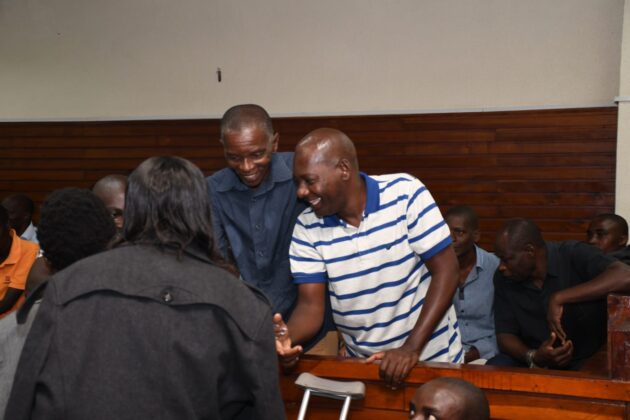
Shakahola victim recounts how she lost 7 children due to starvation » Capital News
NAIROBI, Kenya, Aug 27 – The Shakahola murder trial of controversial preacher Paul Mackenzie and his 29 co-accused proceeded before Lady Justice Diana Kavedza at the Mombasa High Court, with gripping testimony from two prosecution witnesses.
Chief Inspector Sawe Kigen narrated how he led a team of four forensic experts in documenting the Shakahola crime scene, located in Chakama, Lango Baya Division of Malindi sub-county in Kilifi County.
Their operation, conducted between April 19 and October 24, 2023, involved working with a multi-agency team to conduct searches and identify graves, using a mix of intelligence and random reconnaissance.
Through a video recording presented as evidence, Kigen guided the court through the documented scene, pointing out areas where severely emaciated survivors were rescued.
In one of the most emotional testimonies, a protected witness identified as V.M.M., the wife of one of the accused recounted the horrific experience she endured while living in Shakahola.
She revealed that she lost all seven children due to starvation and lack of water. Her introduction to Mackenzie’s Good News International (GNI) Church came via a Christian television channel where the preacher delivered sermons that, over time, became more extreme.
According to her testimony, Mackenzie’s teachings forbade followers from engaging in “worldly” activities, such as wearing makeup (marembo), seeking medical care, or sending children to school, claiming these were against God’s plan for the chosen ones.
She joined the GNI Bombolulu branch in Mombasa County, where members would regularly attend Mackenzie’s seminars in Tononoka, Bomu, and Malindi. Even after the preacher’s TV station was shut down, the indoctrination continued through other means.
A WhatsApp group was created for followers, and soon, they were informed that land had been acquired in Shakahola, a divine wilderness where the faithful were to gather. Members were urged to purchase land in Shakahola at Sh1,000 per acre.
V.M.M. bought two acres for herself and her family. Along with her husband and six children, she relocated to the forest and gave birth to her seventh child while living there.
Upon arrival, a man known as “Alex wa mashamba” received them, guided them to temporary shelters, and instructed them not to build permanent structures. They were directed to a dam, later known as “Mackenzie Dam” as their only water source. V.M.M. told the court that life in Shakahola was controlled.
Regular meetings were held so members from different GNI branches could bond, but interaction with outsiders, referred to as ‘Mataifa’ (non-believers), was forbidden. The followers believed they were ‘Wateule’ (the chosen ones), and mingling with outsiders was discouraged. She identified several of the accused persons in court as leaders who played specific roles in enforcing the rules and indoctrination in Shakahola.
The faithful were encouraged to “crucify themselves” by abstaining from food and water, believing this was the only path to seeing God. She recounted how one of her neighbours, known as Rey, died after fasting to death. Similar fates befell many children, including her own and those of some of the accused.
As the deaths mounted, crying was prohibited during burials. Instead, the followers were told these were not deaths but spiritual “weddings” rituals celebrating unity with God. V.M.M. also revealed that when some families from outside came in search of loved ones, it was difficult for them to find them since they were moved deeper into the forest, making their rescue impossible.
This relocation, she said, was prompted after one GNI member in Yudea was visited by a relative, triggering suspicion and prompting efforts to hide members from the police.
Eventually, weakened by prolonged fasting, V.M.M. said she could no longer carry on and requested to leave. Her plea was met with violence. She was beaten until she lost consciousness.
When she awoke, she found herself in Malindi Hospital, having been rescued.